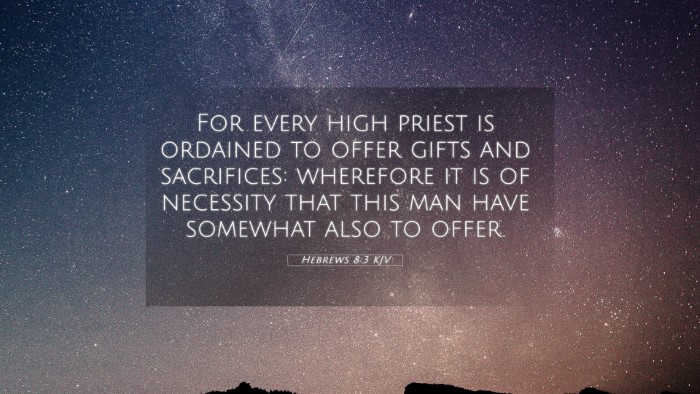Old Testament
Genesis Exodus Leviticus Numbers Deuteronomy Joshua Judges Ruth 1 Samuel 2 Samuel 1 Kings 2 Kings 1 Chronicles 2 Chronicles Ezra Nehemiah Esther Job Psalms Proverbs Ecclesiastes Song of Solomon Isaiah Jeremiah Lamentations Ezekiel Daniel Hosea Joel Amos Obadiah Jonah Micah Nahum Habakkuk Zephaniah Haggai Zechariah MalachiHebrews 8:3 Similar Verses
Hebrews 8:3 Cross References
For every high priest is ordained to offer gifts and sacrifices: wherefore it is of necessity that this man have somewhat also to offer.
Uncover the Rich Themes and Topics of This Bible Verse
Listed below are the Bible themes associated with Hebrews 8:3. We invite you to explore each theme to gain deeper insights into the Scriptures.
Hebrews 8:3 Cross Reference Verses
This section features a detailed cross-reference designed to enrich your understanding of the Scriptures. Below, you will find carefully selected verses that echo the themes and teachings related to Hebrews 8:3 KJV. Click on any image to explore detailed analyses of related Bible verses and uncover deeper theological insights.
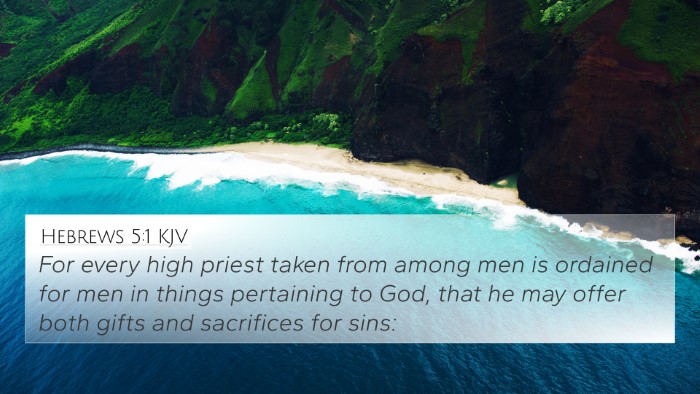
Hebrews 5:1 (KJV) »
For every high priest taken from among men is ordained for men in things pertaining to God, that he may offer both gifts and sacrifices for sins:

Ephesians 5:2 (KJV) »
And walk in love, as Christ also hath loved us, and hath given himself for us an offering and a sacrifice to God for a sweetsmelling savour.
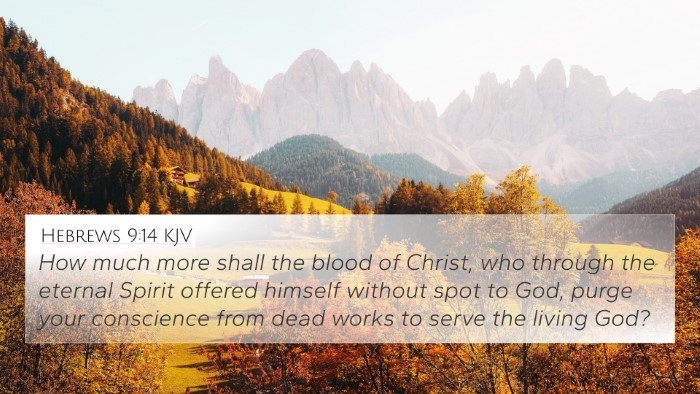
Hebrews 9:14 (KJV) »
How much more shall the blood of Christ, who through the eternal Spirit offered himself without spot to God, purge your conscience from dead works to serve the living God?

Hebrews 10:9 (KJV) »
Then said he, Lo, I come to do thy will, O God. He taketh away the first, that he may establish the second.
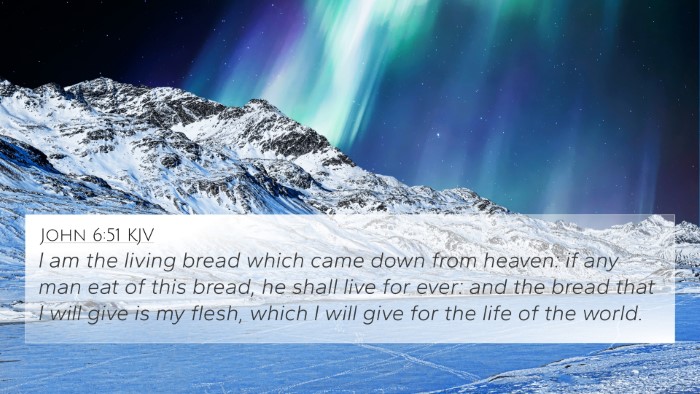
John 6:51 (KJV) »
I am the living bread which came down from heaven: if any man eat of this bread, he shall live for ever: and the bread that I will give is my flesh, which I will give for the life of the world.
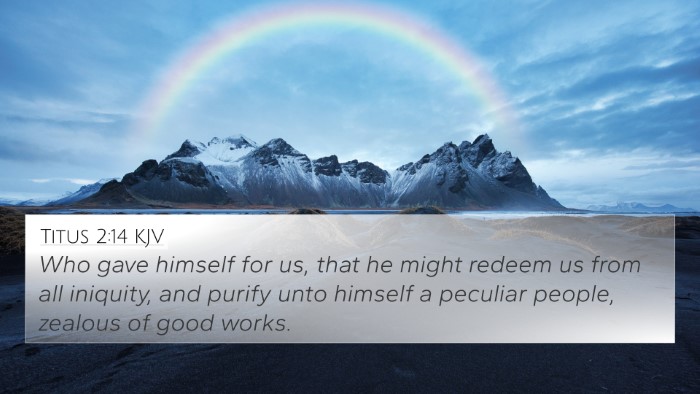
Titus 2:14 (KJV) »
Who gave himself for us, that he might redeem us from all iniquity, and purify unto himself a peculiar people, zealous of good works.
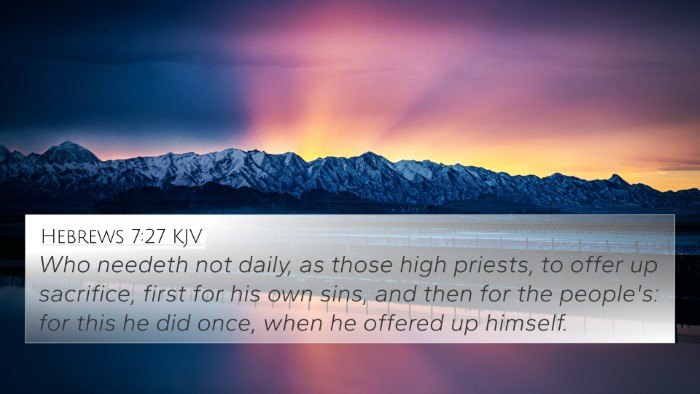
Hebrews 7:27 (KJV) »
Who needeth not daily, as those high priests, to offer up sacrifice, first for his own sins, and then for the people's: for this he did once, when he offered up himself.
Hebrews 8:3 Verse Analysis and Similar Verses
Understanding Hebrews 8:3
Hebrews 8:3 states, "For every high priest is appointed to offer gifts and sacrifices; thus it is necessary for this priest also to have something to offer." This verse highlights the role of the high priest in the Old Testament and the significance of offerings in relation to his office.
Context and Meaning
The author of Hebrews lays out a discourse concerning the superiority of Christ's priesthood over the Levitical priests. In this particular verse, we are reminded that every high priest, as part of his function, must present gifts and sacrifices before God, signifying the need for atonement and worship.
Key Insights from Commentaries
-
Matthew Henry:
Henry emphasizes that the high priest's main duty is to offer gifts and sacrifices, signifying the essential nature of mediation between God and man. The mention of 'something to offer' points to the necessity of Christ, our High Priest, who Himself has offered the ultimate sacrifice, which is Him.
-
Albert Barnes:
Barnes explains the significance of the offerings presented by the high priest, which were not merely rituals but acts of devotion that showed the seriousness of sin and the need for reconciliation with God. He notes that Christ, as our High Priest, fulfills this role by presenting not just offerings, but Himself as the perfect sacrifice.
-
Adam Clarke:
Clarke presents the idea that every high priest must represent humanity in worship, underscoring the importance of intercession. He relates this function to Christ, who offers Himself for the sins of the world and intercedes for believers, thus establishing a deeper relationship between God and man.
Cross References
Hebrews 8:3 connects to a number of other scriptures that illuminate its message:
- Exodus 28:1: God appoints Aaron and his sons as priests.
- Leviticus 16:15: Details of the Day of Atonement and the sacrificial system.
- Hebrews 4:14-16: Jesus as our High Priest who sympathizes with our weaknesses.
- 1 Peter 2:5: Believers are described as a holy priesthood offering spiritual sacrifices.
- John 3:16: The ultimate gift given by God – His Son, which ties into offering and sacrifice.
- Romans 8:34: Christ's role as intercessor is highlighted here.
- Hebrews 9:14-15: Discusses the effectiveness of Christ's sacrifice.
- 1 Timothy 2:5: Jesus as the mediator between God and men.
- Psalm 110:4: A prophetic mention of Christ’s priesthood in the order of Melchizedek.
- Revelation 1:6: Believers made to be a kingdom and priests unto God.
Thematic Connections
Several themes emerge when considering Hebrews 8:3 in conjunction with other scriptures:
- Intercession: The high priest’s role as an intermediary highlights the need for mediation in our relationship with God.
- Sacrifice: The notion of offerings points to Christ’s ultimate sacrifice, essential for redemption.
- Priestly Function: Understanding the continuity and fulfillment of the priestly role from the Old Testament to Jesus.
Utilizing Cross-References in Bible Study
Engaging with cross-references enhances understanding of scripture significantly:
- Tools for Bible Cross-Referencing: Use a Bible concordance or cross-reference guide to explore connections dynamically.
- How to Use Bible Cross-References: Analyze verse relationships through thematic studies such as atonement or intercession.
- Bible Chain References: Create a chain of verses that link concepts together for sermon preparation or personal study.
Conclusion
Hebrews 8:3 serves as a reminder of the rich tapestry of inter-biblical dialogue that exists between the Old and New Testaments, with Jesus fulfilling the high priestly role. The understanding of this verse is deepened through comparative Bible verse analysis, revealing the intricate connections of faith, sacrifice, and intercession that run throughout scripture.

